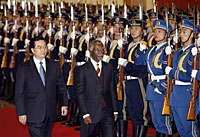
HONG KONG—China is rapidly building strong economic and diplomatic ties among African countries, which will help ensure future energy security for its booming economy, markets for its goods, and a place to invest its capital, experts say.
More than 40 African heads of state and government converged on Beijing at the weekend for the Beijing Summit of the Forum on China-Africa Cooperation, during which a declaration and an action plan for 2007-2009 set the roadmap for future economic cooperation.
“It is a very strategic move on the part of Chinese diplomacy,” Wang Jianwei, politics professor at the University of Wisconsin, told RFA’s Mandarin service.
“It’s as if they’ve just discovered the African continent all over again.”
Broad accord
“It’s not simply a market for Chinese goods. In years to come, following further economic development, it will be a place for Chinese capital to invest,” Wang said.
The Forum’s action plan set out a comprehensive agreement governing political, economic, and cultural ties between China and the African signatories over the next two years, including a pledge to "bolster joint energy and resources exploration and exploitation under the principle of reciprocity and common development.”
It is a very strategic move on the part of Chinese diplomacy. It's as if they've just discovered the African continent all over again.
Noting China and Africa were “highly complementary” in the energy and resources sectors, the document says “better information sharing and pragmatic cooperation” in these sectors “serves the long-term interests of both sides.”
China would work to help African countries “turn their advantages in energy and resources into development strengths” while giving “high priority” to environmental protection and sustainable development in the continent, the action plan said.
The plan also voiced determination to combat HIV/AIDS, malaria, tuberculosis, Ebola, chikungunya, avian influenza, and other communicable diseases.
Wang likened Beijing’s policy in Africa to the U.S. approach in building ties with the developing world, with China very firmly in the dominant and didactic role.
“If you take a look at the eight measures of President Hu Jintao with regard to Africa you’ll see that they have even set up a system of youth volunteers, which is a bit like the U.S. Peace Corps sending volunteers out to developing countries,” Wang said.
“Every single one of the 48 nations of Africa with ties with Beijing attended this summit, which just goes to show that China already has a good basis from which to work in Africa.”
Yang Liyu, professor in the Asian Studies Department of Seton Hall University, noted the detailed nature of the plan.
No human rights strings attached
“This cooperation is set out in a very practical way covering many areas, including the development of natural resources, and so on,” Yang told RFA reporter Han Qing.
He said China had only recently begun to focus once again on Africa, once the province of former premier Zhou Enlai, driven by the need for new markets and new resources.
“Premier Zhou visited the continent six times,” Yang said. “But after Mao took power, the foreign relations focus was always on Europe and the United States. It’s only in recent years that Beijing has come to see Africa as a powerful region.”
“So now China is making inroads into Africa, step by step. And this conference has marked the completion of the first of those steps,” he said.
Both Wang and Yang said China’s involvement in Africa was eased by a lack of emphasis on both sides on issues of human rights and democracy.
“China’s developmental relationship with the United States and European countries is often complicated by issues of human rights, freedom and democracy, whereas many African countries have worse records than China’s on that score, and the problem doesn’t exist,” Yang said.
“China doesn’t bring up these issues with those regimes either, because its own record is quite seriously bad,” he said.
Wang agreed. “China’s policy towards African countries doesn’t really care about how they are run and it doesn’t attach any conditions for internal political change. So, for that reason the Chinese are very popular in Africa,” he said.
But Yang said he also saw an element of political strategy in Beijing’s shift into Africa.
“All the African countries attended this summit, except the five countries which currently give diplomatic recognition to Taiwan, so there is another intention here, and that is to increase pressure on those five countries,” Yang said.
“So it’s about resources, and it’s about strategy, and it’s about putting pressure on Taiwan.”
As part of the action plan, Beijing has pledged assistance to African countries to build 30 hospitals and 300 million yuan (U.S.$37.5 million) in aid funding to provide anti-malaria drugs to African countries.
It will also build 30 demonstration centers for the prevention and treatment of malaria in the coming three years, it says.
In addition, China will establish more Confucius Institutes in African countries to meet local demand for Chinese language teaching, and will encourage Chinese universities to teach African languages.
It also spells out China’s decision to help African countries set up 100 rural schools in the coming three years and increase the number of scholarships for African students in China to 4,000 a year by 2009 from the present 2,000.
The Chinese government also vowed to provide annual training for a number of educational officials as well as heads and leading teachers of universities, primary, secondary and vocational schools in Africa.
It also raised the number of approved African destinations for Chinese tourists to 26, paving the way for greater tourist ties between the regions, according to official Chinese media.
Original reporting in Mandarin by Han Qing. RFA Mandarin service director: Jennifer Chou. Translated and written for the Web in English by Luisetta Mudie. Edited by Sarah Jackson-Han.